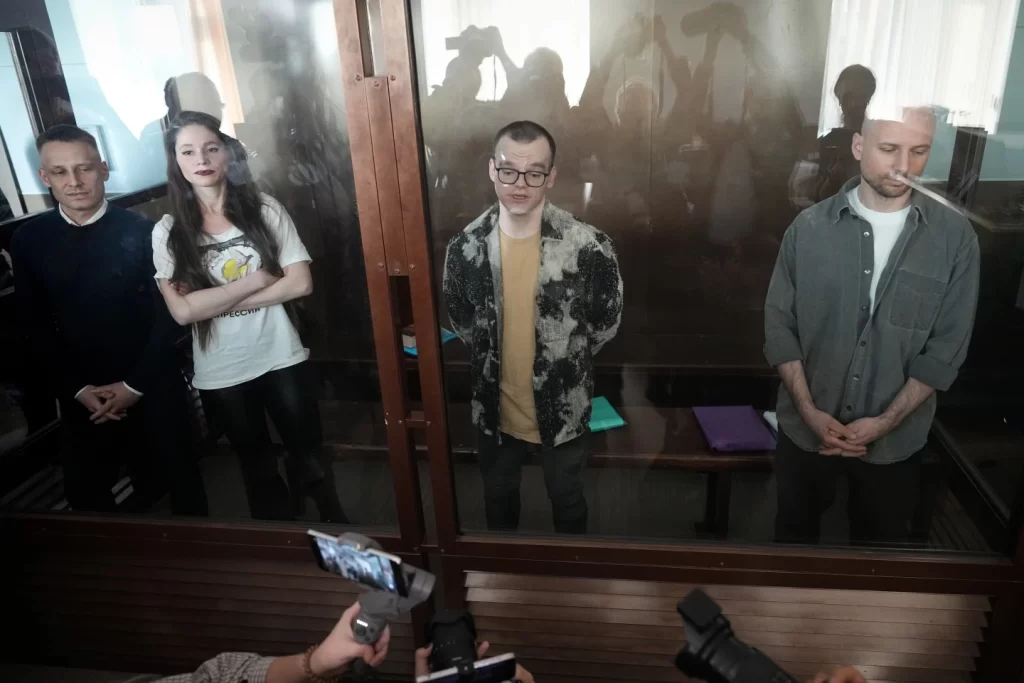Four Russian journalists stood trial Wednesday in Moscow, facing accusations of involvement with an anti-corruption organization founded by the late opposition leader Alexei Navalny, which Russian authorities designated as an extremist group in 2021.

Antonina Favorskaya, Artyom Kriger, Sergey Karelin and Konstantin Gabov were arrested earlier this year on charges of participating in an extremist group, an offense carrying a potential six-year prison sentence. All four have denied the allegations.
The trial, conducted behind closed doors, marks another step in the Kremlin’s intensifying suppression of dissent, which has reached new heights following Russia’s full-scale invasion of Ukraine over two years ago. Authorities have targeted opposition figures, independent journalists, rights activists, and ordinary citizens critical of the government with various criminal and administrative charges, resulting in hundreds of imprisonments and thousands fleeing the country to avoid prosecution.
Prosecutors accuse the journalists of working with Navalny’s Foundation for Fighting Corruption, outlawed as an extremist organization by Russian authorities in 2021 – a decision widely regarded as politically motivated.

Navalny, who was President Vladimir Putin’s most prominent and outspoken critic, died in February while serving a 19-year sentence in a remote Arctic prison. He had been convicted on charges including running an extremist group, which he consistently denied as politically driven.
Favorskaya and Kriger were employed by SotaVision, an independent Russian news outlet known for covering protests and political trials. Gabov worked as a freelance producer for various organizations, including Reuters. Karelin, a freelance video journalist, has contributed to Western media outlets, including The Associated Press.
As the defendants entered the courtroom, supporters greeted them with applause. Inside, the four journalists smiled at their loved ones from a glass defendant’s cage.
Kriger, addressing reporters from behind the glass, framed the case against him and his colleagues as a warning, urging journalists still in Russia to leave the country. “It is not a joke, any person can be charged with anything,” he said.
Favorskaya spoke of hope, stating, “Everything that is happening now, the darkness that surrounds us, it is not forever, and we will definitely see the country that Alexei (Navalny) dreamed of, we will definitely live in a country where rights and freedoms will be (respected) and journalists and other people will not be jailed for their views.”

Shortly after the hearing began, the judge ordered the proceedings to be held behind closed doors at the prosecution’s request, despite objections from the defense.
Olga Karelina, sister of defendant Sergey Karelin, told the AP that her life now revolves around supporting her brother and managing his affairs while he’s detained. She noted that Karelin, initially “petrified” upon his April arrest, has since developed “a healthy anger, which is good.”
SotaVision founder Alexandra Ageyeva views the case as an extension of ongoing pressure on independent media in Russia. The outlet was designated as a “foreign agent” last year, a label that imposes additional government scrutiny and aims to discredit the recipient.
“We expect the worst,” Ageyeva said regarding the trial’s outcome. “And we expect a further crackdown on our news outlet. Of course, we’re not violating any laws, we’re working completely openly. But, apparently, independent journalism is too dangerous for the current regime.”
The trial continues to unfold amid growing concerns over press freedom and human rights in Russia.
AP


